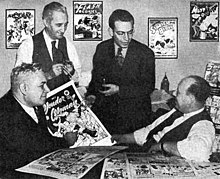William M. Marston
| William Moulton Marston | |
|---|---|

|
|
| Born |
May 9, 1893 Saugus, Massachusetts, United States |
| Died | May 2, 1947 (aged 53) Rye, New York, United States |
| Cause of death | Skin cancer |
| Resting place |
Ferncliff Cemetery Hartsdale, New York |
| Nationality | American |
| Other names |
Charles Moulton Bill |
| Education |
Harvard University B.A. 1915 LL.B 1918 PhD 1921 (Psychology) |
| Occupation | Psychologist writer |
| Employer |
American University Tufts University |
| Known for | Systolic blood-pressure test Self-help writer Advocate for women's potentials Creator of Wonder Woman Important contributor to DISC |
| Successor | Robert Kanigher |
| Spouse(s) | Elizabeth Holloway Marston |
| Partner(s) | Olive Byrne |
| Children | (Elizabeth's children): Pete, Olive Ann & Fredericka (died at infancy) (Olive's children): Byrne & Donn |
Charles Moulton
William Moulton Marston (May 9, 1893 – May 2, 1947), also known by the pen name Charles Moulton, was an American psychologist, lawyer, inventor, advocate for women, writer, and comic book writer who created the character Wonder Woman. Two women, his wife Elizabeth Holloway Marston and Olive Byrne (who lived with the couple in an extended relationship), both greatly influenced Wonder Woman's creation.
He was inducted into the Comic Book Hall of Fame in 2006.
Marston was born in the Cliftondale section of Saugus, Massachusetts, the son of Annie Dalton (née Moulton) and Frederick William Marston. Marston was educated at Harvard University, receiving his B.A. in 1915, an LL.B. in 1918, and a PhD in Psychology in 1921. After teaching at American University in Washington, D.C., and Tufts University in Medford, Massachusetts, Marston traveled to Universal Studios in California in 1929, where he spent a year as Director of Public Services.
Marston is credited as the creator of the systolic blood pressure test, which became one component of the modern polygraph invented by John Augustus Larson in Berkeley, California. Marston's wife Elizabeth Holloway Marston is said to have suggested a connection between emotion and blood pressure to William, observing that, "[w]hen she got mad or excited, her blood pressure seemed to climb" . Although Elizabeth is not listed as Marston's collaborator in his early work, Lamb, Matte (1996), and others refer directly and indirectly to Elizabeth's own work on her husband's research. She also appears in a picture taken in his laboratory in the 1920s (reproduced by Marston, 1938). Marston set out to commercialize Larson's invention of the polygraph when he subsequently embarked on a career in entertainment and comic book writing, and appeared as a salesman in ads for Gillette Razors, using a polygraph motif. Some have linked the device to the Lasso of Truth associated with the comic book character Wonder Woman, but there is no evidence that proves it inspired the Magic Lasso, and a direct connection is difficult to demonstrate.
...
Wikipedia
